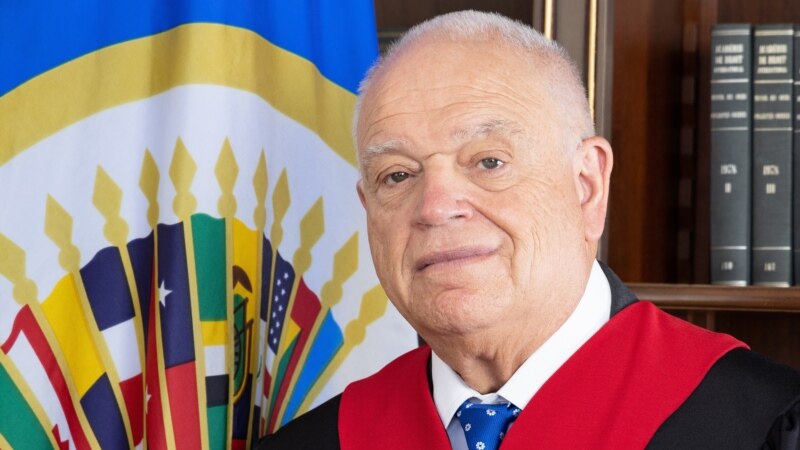
The president of the Inter-American Court of Human Rights, Ricardo Pérez Manrique, will appear this Friday before the plenary session of the General Assembly of the Organization of American States (OAS) to present the report on the work carried out, but also to reinforce the message to the foreign ministers not to take our eyes off a key issue for democracy such as the protection of all fundamental guarantees.
For the president of the regional organization, whose sentences for the defendant cases are binding and of obligatory compliance for the countries, in the face of the demands on human rights violations in the member countries and signatories of the Inter-American Charter of Human Rights, he says in an interview with the voice of america that freedom of expression is key to measuring the quality of democracies in the region.
The Court -explains Pérez Manrique- values the fundamental freedoms of individuals and how in a democratic State of law “one must live with freedoms, and where the separation of powers is a central point”, as well as freedom of expression.
“Unfortunately, the repression of authoritarian regimes is focused on journalists, as well as human rights defenders; journalists have been on the front line in terms of denouncing and being the object of attacks, the protection of journalists is a strategic issue and it is central to the very validity of the democratic rule of law, because if there is no freedom of expression, there is no democracy”, says the president of the Inter-American Court.
Nicaragua and “political time” concerns
While the foreign ministers and heads of delegation of the 33 active OAS countries discuss a resolution in plenary session of the regional organization that would establish a position on the sociopolitical crisis in Nicaragua, a country that has excluded itself from the regional organization, the presiding judge Pérez Manrique explains that the Central American country’s contempt for rulings on political prisoners, and flagrant violations of human rights are still ongoing.
The Inter-American Court said that it transferred the process to the instance of political power of the OAS so that it feels a joint position, and that the judges have contributed since the end of 2022 to explain to the regional organization “technical aspects” to understand the scope of the mandate of the Inter-American Charter of Human Rights.
With this, it says that the I/A Court HR is also going through a period of concern due to “the political times that are being lived in the region”, and that of these, special attention is paid to Nicaragua with all the processes that led to the contempt of the government of Daniel Ortega.
The Court -he says- has already directly transmitted “its concerns” to the Permanent Council of the OAS, for the steps to come.
“We believe that in this General Assembly there can be a resolution on Nicaragua from all the foreign ministers of the region,” said Pérez Manrique.
Challenges to protect human rights
Pérez Manrique says that the Inter-American Court of Human Rights, based in Costa Rica, which reviews the complaints after they are admitted and processed by the Inter-American Commission on Human Rights (IACHR) and when the countries do not respond to the measures of the parallel instance in Washington, they bring the cases before the Inter-American Court.
The judge comments to VOA that the fundamental work of the Court is to “contribute to peace in the region” through the protection of the fundamental rights of the more than 600 million Latin Americans who in different circumstances face significant challenges where the States must play a leading role in protection of fundamental rights.
The very issues that the Court deals with, such as sexual and reproductive rights for women in the “Beatriz Case” against the State of El Salvador, awaiting sentencing, arouse conflicting points of view in the regional body. In the inaugural session on Wednesday, civil society organizations expressed opposing points on this issue that, from larger to smaller scale, faces different perspectives in Latin America.
Judge Pérez Manrique says that most of the issues that reach the plenary session generate “very interesting debates” among the magistrates of the regional body where “different approaches” predominate, which are externalized in the end to reach a common point with their actions.
“One is the guardian of people’s guarantees,” adds Pérez Manrique, with a long career as a jurist and constitutionalist in his native Uruguay, plus his contributions to academia and other multilateral organizations.
“The legacy that I would like to leave in my mandate is that of a judge who was concerned about these issues and used his energies to spread the task of protecting human rights throughout the continent,” he said.
Connect with the Voice of America! Subscribe to our channel Youtubeand activate notifications, or follow us on social networks: Facebook, Twitter and instagram.












